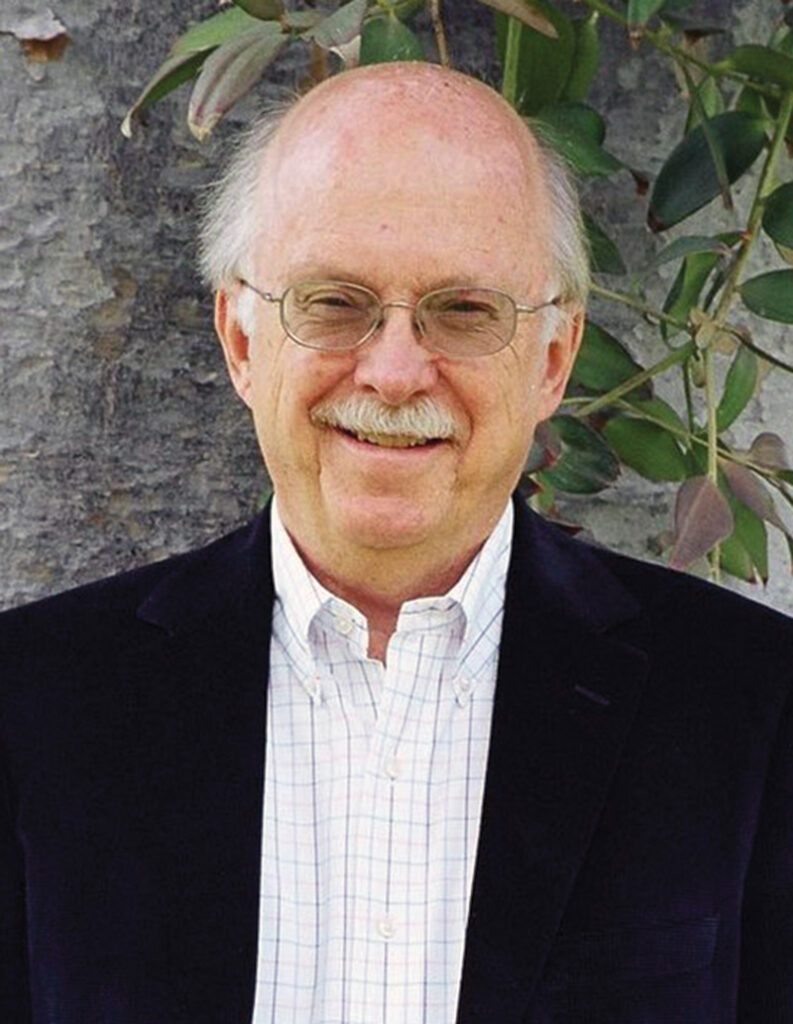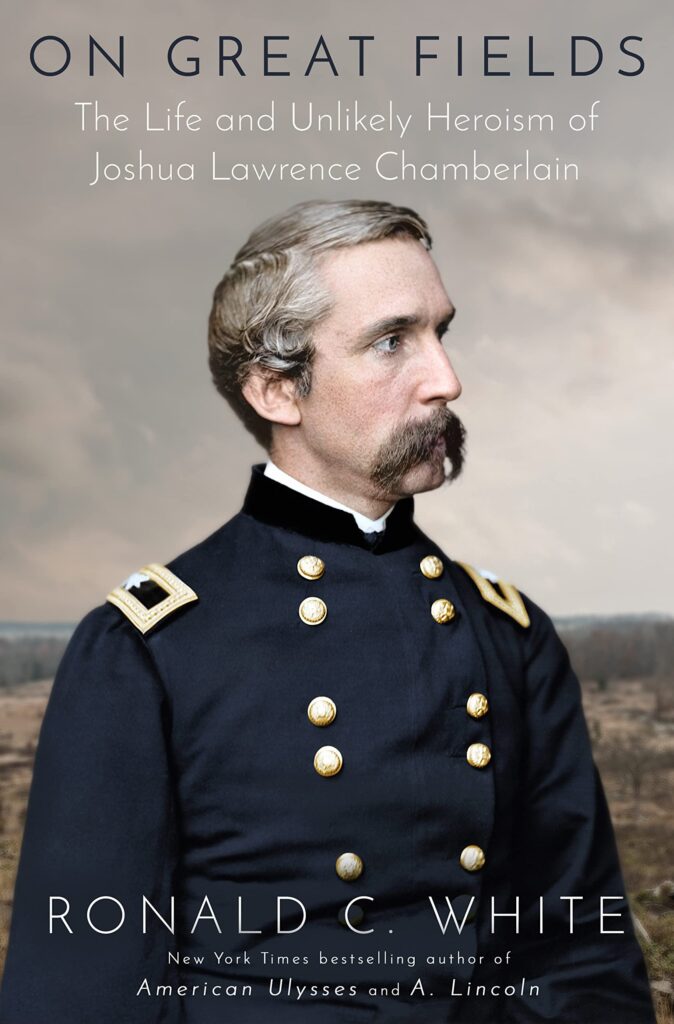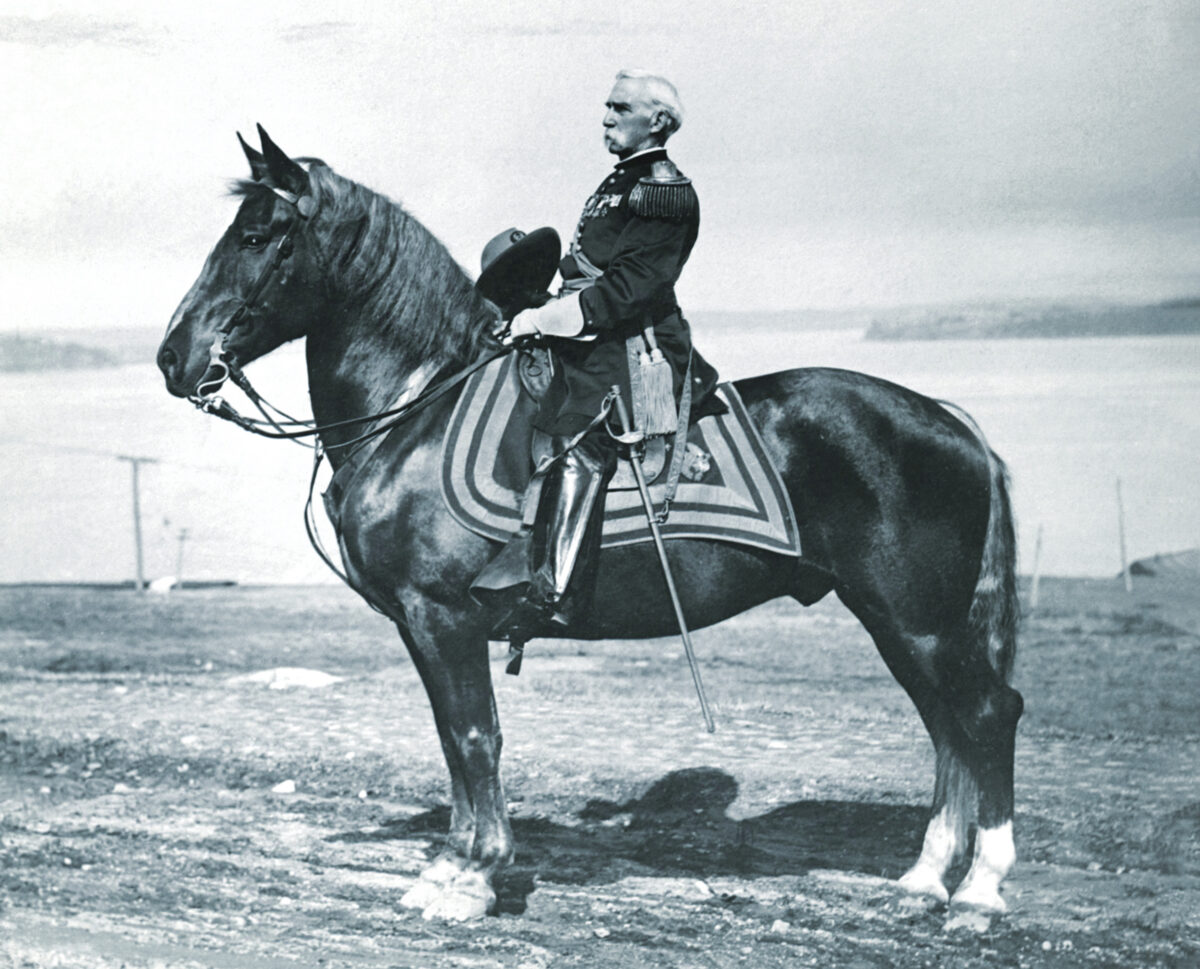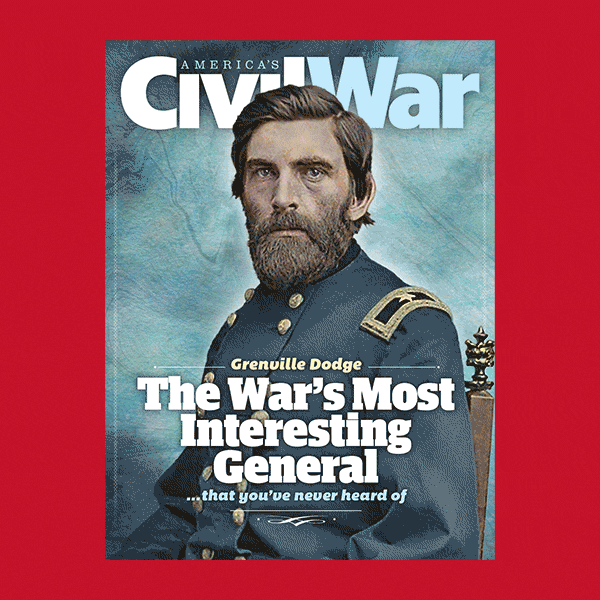Thanks to modern media, Joshua L. Chamberlain is remembered today for his bravery on Little Round Top at the Battle of Gettysburg. He was much more than a Civil War hero, however. A new biopic by award-winning historian Ronald C. White examines the full breadth of the man who went from mild-mannered college professor to Medal of Honor recipient and one of the Union Army’s most respected generals. On Great Fields: The Life and Unlikely Heroism of Joshua Lawrence Chamberlain (Penguin Random House, 2023) offers a deep dive into Maine’s native son, who spoke nine languages, served as a four-term governor of Maine, was president of his alma mater Bowdoin College, and, yes, had a remarkable mustache. Chamberlain was the real deal: honorable, dutiful, religious, intellectual, compassionate and committed to the ideals of the Republic. America’s Civil War recently spoke with White about his new book and what he learned about the “Lion of Round Top.”

After writing about Abraham Lincoln and Ulysses Grant, what drew you to Chamberlain?
I was speaking about Grant at the Jonathan Club in downtown Los Angeles and someone said, “What is your next book? And I said, “I’m not exactly sure. Do you have any ideas?” And suddenly this fellow literally leapt up in the back of the room and shouted out, “Joshua Lawrence Chamberlain!” Well, I didn’t really know that much about him, so I took it to my editor and publisher. We looked at the things that were already out there and realized there was a need for a full-scale biography—not simply Chamberlain at Little Round Top, which is very important, but an in-depth book. So that’s how it all started.
What surprised you the most about him?
To me, it was the whole religious story. His father wants him to go to West Point, his mother wants him to be a minister or missionary, so he goes to Bangor Theological Seminary after Bowdoin College. At the end of those three years, Chamberlain receives three calls to Congregational churches in Maine and New Hampshire, but he offers an address at Bowdoin’s commencement. It is so successful they offer him a teaching position. In all other biographies, those three years at Bangor are literally erased. I mean, they were important for him. All the records of the seminary, which was founded in 1814, are at the Maine Historical Society. I realized that if I was going to devote two chapters to Chamberlain’s four years at Bowdoin College, I needed to devote at least one chapter to his three years at the Bangor Theological Seminary. I was able to find things that no one else had ever looked at before. This is part of his formation, part of his shaping, part of the values that he will carry forward.
Chamberlain has a strong sense of duty and honor. Where does that come from?
As a professor at Bowdoin during the first year of the Civil War, he saw how many of his students volunteered, how many of them were captured, how many of them were killed. He watched as these 17-, 18-, 19-year-olds go off to war. Finally he comes to the conclusion that this war cannot simply be fought by boys. It has to be fought by men of his distinction and substance. He was 33 years of age with a wife and two young children, so no one would criticize him for not serving. Yet he decides he must do this. His sense of duty compels him to do it.
When Chamberlain volunteers for the Army, he turns down his first commission. Why?
I love that. The governor of Maine said, “I’ll make you colonel.” He responds, “No, I don’t deserve that title. Make me lieutenant colonel. I’m not a military man, but I can learn.” That was terrific. It shows the humbleness of the man.
What impact did his religious and educational background have on his service in the military?
People went off to the Civil War in those days with patriotic values and Christian values, both of which would be severely tested. They were not at all prepared for what they would encounter in the Civil War in terms of the suffering and death. His strong faith helped him get through a horrible war and gave him the strength to survive a wound that would impact his life for 50 years.
How important was Chamberlain’s role at Little Round Top?
It was a very important moment at the Battle of Gettysburg. Chamberlain never demeaned—he actually lifted up—the role of Union Colonel Strong Vincent. He gives him incredible credit. Vincent is the one who, before the battle begins, says, “You will hold this line.” The same with General Gouverneur Warren, who was the first to see that Little Round Top was in danger because it wasn’t defended. Years later, Chamberlain will become an important witness for Warren, who was trying to restore his rank after he had been relieved of command by General Phil Sheridan. There’s not just one person who needs to be remembered at Little Round Top. In 1889, Chamberlain is at a reunion of the 20th Maine. He acknowledges that many things had been claimed about that engagement. He said, “We’re all right. We’re all correct.” I thought that was really a statesman-like comment. Years later, there’s no point trying to argue who did or didn’t do that. “We are all right.” That, to me, is Chamberlain.
When things were dire at Little Round Top, Chamberlain gives a one-word order.
He later said he didn’t have time to give some embroidered command. It was simply, “Bayonet.” That was understood by the men under his command. They were running low on ammunition and knew what they had to do.
Little Round Top was Chamberlain’s first serious introduction to combat.
This is what surprised many people and why I use “Unlikely Hero” in the title of my book. You wouldn’t think of a mild-mannered college professor being willing and able to act with courage and be so daring in battle. When I was at West Point a few years ago, several members of the faculty told me they believe Chamberlain is an embodiment of what military leadership should be all about. My friend David Petraeus [retired U.S. Army general and former CIA director], who thinks Grant is the greatest general of all time, also thinks Chamberlain is a great, great military leader. So it’s not just me, someone writing a biography, but it’s military people themselves who are validating Chamberlain’s leadership.
Chamberlain is given the nickname “Lion of Round Top.” Does he deserve it?
I think it is well deserved. He earned it. Chamberlain led by example. When the 20th Maine rushes down the hill with bayonets, Chamberlain is out front with them. He confronts an officer with a sword and a pistol [Lieutenant Robert H. Wicker, 15th Alabama] and he convinces him to surrender. That’s an amazing story. He was not afraid to face death.
What happens to Chamberlain at Petersburg in June 1864?
He almost died at Petersburg. Chamberlain was shot through the hip and it caused severe internal damage. It was a horrible injury that would plague him for the rest of his life. He had several surgeries and suffered terrible pain and infections until the day he died. He never, never complained and never really talked about it. He earns the nickname Bloody Chamberlain that day. He suffered a terrible pelvic wound that probably would have killed another man, then he’s leading his troops again less than a year later. His mother says to him, “Have you not given enough of yourself? You’ve done more than enough. Let other people do it.” He answers, “No, I have yet to finish this job.” The record is not clear, but Chamberlain may have used a catheter for the rest of his life. With the Civil War, we often focus on amputations as a big thing. What I learned from several scholarly articles was that it was really these invisible wounds hidden from sight that were the most prevalent and the most terrible. They went on for the rest of your life. You never got rid of them. Chamberlain finally dies, ultimately from the infections from his wounds, in 1914. He is considered the last Civil War veteran to die from his injuries.
His wound likely caused incontinence, constant pain and maybe sexual dysfunction. How does he endure this?
Again, he never talks about it, but you have to imagine what this meant for his entire life, for 50 years after the Civil War. That’s a long, long time. I think his faith enables him to accept it. I was surprised to learn that several people would see him in pain and ask why he never talked about it. He was not the kind of man who would do that. Not at all.
Chamberlain, a strong Unionist, did not believe in the Confederate cause. Yet he does something unusual during the surrender at Appomattox.
This, to me, was so much the essence of who Chamberlain is. He never accepted their cause, but he always applauded their courage by ordering his troops to salute the surrendering soldiers. This can be difficult for contemporary audiences who are revisiting Confederate monuments and wondering if Robert E. Lee was a traitor. I want to emphasize he never, ever accepted the cause of slavery or the cause of disuniting the Union, but he never gave up his compassion for the courage of these men. He could hold both of those views at the same time.I don’t think the salute was a planned thing. I would argue that like his actions at Little Round Top, this all ultimately grows out of his whole set of values. It’s understandable because this is who he was. His whole idea of wanting reconciliation with the South as just a part of his faith, his values, the formation of his life.
Some historians claim Chamberlain embellished his Civil War record, but you don’t think so. Why?
I found confirmation for several of his claims. For example, John Brown Gordon, the Confederate general who surrendered at Appomattox. He and Chamberlain were really on the same page about what happened. That discovery was quite fascinating. Chamberlain was also accused of changing his speeches. After the war, he was reading all these regimental histories. When he got new information, he put that into his addresses. It says a lot about who he is. I think it is a great quality that he wanted to set the record straight.
What do you want readers to take away from your book? How do you want them to remember Joshua Lawrence Chamberlain?
As a rediscovered hero of America who has the kind of values that we need to have in our society today. And what is the source of those values? It’s both his classical education and his Christian education. And I think he is a great example of what a person can do, even facing immense difficulty with his wounds for 50 years. He perseveres and becomes not simply the Civil War hero, but the governor of Maine, president of Bowdoin College, and one of the great speakers about the values of the American democracy in those decades after the Civil War. No one spoke more eloquently than Chamberlain about what it meant to be an American in the last part of the 19th century and early part of the 20th century. I wish we had people like him around today. Chamberlain had integrity and duty and loyalty. Those were the bedrock values in his life.

On Great Fields
The Life and Unlikely Heroism of Joshua Lawrence Chamberlain
By Ronald C. White, Penguin Random House, 2023
If you buy something through our site, we might earn a commission.






